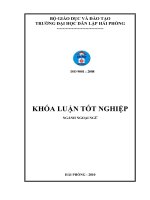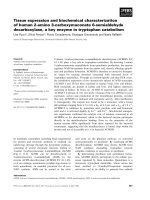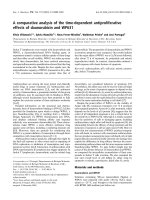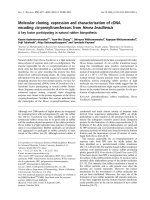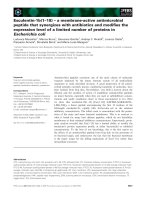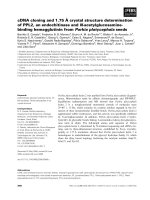1 - Time - A Key Resource Opportunities And Difficulties.pdf
Bạn đang xem bản rút gọn của tài liệu. Xem và tải ngay bản đầy đủ của tài liệu tại đây (49.27 KB, 10 trang )
1
Time: a key resource
– opportunities and
difficulties
Success is a process, a quality of mind and way
of being, an outgoing affirmation of life.
Alex Noble
Whatever job you do, if you are in a management or executive
role, you will utilise a number of resources. People, money,
materials – all are important. In any particular job, one
resource may predominate. But there is one resource we all
have in common: time. And time is a hard taskmaster.
Everyone occasionally experiences problems getting everything
done, and doing it all in the time available. For some, such
problems seem perpetually to exist to one degree or another;
others will admit to having moments when things seem to
conspire to prevent work going as planned, and a few to living
in a state of permanent chaos.
Who then needs to think about time management? Everyone,
potentially, can benefit from reviewing how to manage their
time effectively. In any organisation many of the things that
actually characterise its very nature make proper time man-
agement difficult: hierarchical structures, people, deadlines,
2 ■ Successful time management
paperwork, e-mail, computer problems, meetings, pressures
and interactions, both around the organisation and externally;
all these and more can compound the problems.
This book aims to help solve the problems of time manage-
ment for all those working in executive or managerial positions
within organisations, whether commercial or otherwise, and
who are charged with getting things done and achieving results.
If you are in this category, even if you have already made stren-
uous attempts to organise the way you work, then you may
pick up ideas that will help you achieve more. If you see your-
self as having too much to do, if you have too little time in
which to do it, if coping with the urgent means you never get to
all the important things on your list, and you would like to be
more organised and do not quite know how to go about
becoming so, then this book is directed at you. If your desk is
piled with untidy heaps of paper, you are constantly subject to
interruptions, your deadlines are impossible and you despair of
ever being able to get your head above water, then this book is
definitely for you.
Time management is not optional. It is something that
everyone who wants to work effectively must consider, whether
formally or informally. In fact, virtually everyone practises time
management to some degree; the only question is how well they
do it and how it affects what they do. Yet, time management is
not easy – as you may have noticed! Nor, even for those who
work at it, is it something that anyone gets 100 per cent right.
If you think that is a rather ominous start to a book on time
management, there is worse to come. The classic author G K
Chesterton wrote: ‘The Christian ideal has not been tried and
found wanting. It has been found difficult; and left untried.’ So
too with time management: just because it is difficult, the temp-
tation can be to despair of ever making a real difference, and to
give up on it, letting things take their course and muddling
through somehow. To varying degrees, this temptation is often
very strong.
Time: a key resource – opportunities and difficulties ■ 3
Making it work
But, and it is a positive but, you can make a difference and such
a difference cannot only be worthwhile, it can have a radical
effect on both job and career. Make no mistake: the effect of
getting to grips with time management can be considerable and
varied. It can:
■ Affect your efficiency, effectiveness and productivity. This
alone makes your attitude to time management very impor-
tant, for it affects your work day by day, hour by hour, all
the time.
■ Condition the pressure that goes with any job.
■ Create greater positive visibility. Time management is
something that will influence how you are perceived by
others within the organisation. Good time management is
an overriding factor that can differentiate people of other-
wise equal talent and ability, making it more likely that
some will succeed better in career terms than others.
Thus, although it may take some time, getting to grips with
your own personal system of time management is immensely
important. Time management must be seen as synonymous
with self-management; it demands discipline, but discipline
reinforced by habit. In other words, the good news is that it
gets easier as you work at it. Good habits help ensure a well-
organised approach to the way you plan and execute your
work. On the other hand, bad habits – as many of us are aware
– are difficult to shift. And the changing of habits is something
that may well be a necessary result of any review of how you
work.
Making time management work for you is based on two key
factors: how you plan your time and how you implement the
detail of what you do. The first of these, which is reviewed in
the early part of this book, creates an important foundation
4 ■ Successful time management
upon which you can then build and work. The second consists
of a multitude of operational factors, practices, methods and
tricks, all of which can individually and positively affect the
way in which you work. Such factors may be absurdly simple,
for example, visibly checking your watch from time to time will
tend to make visitors less likely to overstay their welcome,
especially if such checks are accompanied by the appropriate
look of concern. Or they may demand more complexity, for
example, a well-set-up filing system can save time, ensuring
that you can locate papers quickly and accurately.
Other factors may be downright sneaky, like having a private
signal to prompt your secretary to interrupt a meeting with
news of something demanding its rapid curtailment or your
prompt departure. Furthermore, there is a cumulative effect at
work here. This means that the more you adopt or adapt the
tricks of the trade that work for you, the more time-efficient
you become. This is a process that most of us can continue to
add to and work on throughout our career. So, unless you are a
paragon of time-efficient virtue, a review of whether you are
working in the best possible way is nearly always worthwhile.
Indeed, it can pay dividends to keep a regular eye on this
throughout your working life. This too can become a habit.
A personal approach
Because of the way time management works, influenced as it is
by many things, what works in any particular kind of job or for
any particular individual will vary. Some of the ideas you will
find presented here, or elsewhere, you will be able to add prof-
itably to your own working habits. Some will be new to you;
some you will know but may not be utilising as effectively as
you might. Others will be able to form only the basis of what
will suit you. They will need personalising, tailoring to the
circumstances in which you work, and it is always important to
Time: a key resource – opportunities and difficulties ■ 5
consider this option with any idea you review before rejecting
it.
Be careful not to reject out of hand anything that might be
useful in amended form. This is an area where every small
influence can assist your overall productivity. Of course, some
ideas will not suit you at all. However much you tinker with
them, they will not form a useful basis for the kind of way in
which you work. So be it. The aim should be to review thor-
oughly and then use every possible way to enhance the produc-
tivity of your job. What matters is arriving at a point where
you are content that, having explored the possibilities for
action, you have selected, adapted and experimented with all
the methods that can realistically fit in with the way you
work and assist your productivity. It is you who matters ulti-
mately, not the principles. However, do remember that
anything – but anything – that can help should be considered
and, unless it has a negative impact, made part of your working
practice. Good time management comes from leaving no stone
unturned.
The productivity gain
Time may be relative, but it is a resource as valuable as any
other. Yet, it is so easy to squander. Why is it that the thought
and effort given to the appropriate use of other resources,
money for instance, is so much greater than for time? The sheer
difficulty of some aspects of time management and the power
of habit explain some of this, but there is, I think, another
reason.
Long ago Peter Cook appeared in a sketch about the possi-
bility of a nuclear war, when it was said that the early warning
radar would give four minutes’ warning of any enemy missiles
aimed our way. ‘What can you do in four minutes?’, asked one
character incredulously. ‘Some people’, came the reply, ‘can run
a mile in four minutes!’ Though sadly inadequate for the task
6 ■ Successful time management
of escaping from annihilation, four minutes is still, well, four
minutes, and it is an important principle of time management
that even small periods of time can readily add up to a worth-
while amount.
Consider four minutes saved – by not running that mile
perhaps. It is easy to think of it as not worthwhile. However, if
the four minutes is saved by increasing efficiency on one small
task undertaken regularly then, for something done every day,
that adds up to more than 14 hours over a year! That is very
nearly as much as two working days, and should give anyone
pause for thought. What could you do – extra – with two addi-
tional working days? It is undeniably a useful amount of time
and most people have probably got a dozen jobs on their list
that could be got out of the way if an additional two days were
really available. This thought comes from imagining what
speeding up just one small regular task or perhaps avoiding
wasting time, to the tune of just four minutes, can do for
you. So, another significant reason why time management
may be neglected is that individual small savings of time may
seem unimportant. We tend to wonder what five minutes here
or there matters, when what is really needed is a clear hour or
day without interruptions. Yet, clearly, such short moments
add up.
If this fact is recognised, and time and activities planned
accordingly, then it is possible to free up considerable amounts
of time. What is more, this can often be done at minimal cost.
This is worth noting, as many potential improvements to effi-
ciency do have a cost. If you want new equipment, more in
your budget, or additional people, then in many organisations
this needs considerable justification and may still be turned
down. But your time is yours to utilise. It is an area where you
can make a real difference to performance armed with little
more than the intention to do so.
Time: a key resource – opportunities and difficulties ■ 7
Speculate to accumulate
A further point needs stating before we turn to areas of indi-
vidual action. You will find that some ways of saving time, or
utilising it better, do need an investment – but it is an invest-
ment of time. It may seem like a contradiction in terms, having
to spend time to save time. Again, this can all too easily become
a barrier to action. Yet the principle is clear: there is a time
equation that can and must be put to work if time is to be
brought under control. There are many ways of ensuring that
time is utilised to best effect, and, while some take only a
moment, others take time either to set up or for you to adopt
the habit of working in a particular way.
Consider an example, one linked to delegation, a subject we
return to later and to the commonly heard phrase, ‘It’s quicker
to do it myself.’ When this thought comes to mind, sometimes,
and certainly in the short term, the sentiment may well be
correct. It is quicker to do it yourself. But beware, because this
may only be true at the moment something occurs. Say
someone telephones you requesting certain information,
imagine also that you must locate and look something up,
compose a brief explanatory note and send the information off
to the other person. It is a minor matter and will take you three
or four minutes. Imagine further that, to avoid the task, you
consider letting your secretary do it. Explaining and showing
him or her what needs to be done will certainly take 10–15
minutes of your time and your secretary’s. It really is quicker to
do it yourself. Not so, certainly not if it is a regularly occurring
task. If it happens 10 times a week, say, then if you take time to
brief your secretary he or she will only have to take it on for
less than a week and the time spent briefing will have paid off.
Thereafter you save a significant amount of time every week,
indeed on every occasion that similar requests are made in the
future. This is surely worthwhile. The time equation here of
time spent as a ratio of time saved works positively. This is
8 ■ Successful time management
often the case, and allows worthwhile savings to be made, both
to simple examples and to more complex matters where hours
or days spent on, say, reorganising a system or process may still
pay dividends.
So, why is it so difficult to take this sort of action? Why is the
world full of people saying that it is quicker to do some things
themselves? Some of the reasons may be to do with attitudes to
delegation (of which more later); beyond that it is largely habit
and lack of thought – and perhaps the pressure of the moment.
We judge that it is possible to pause for the few moments neces-
sary to get another task out of the way, but somehow not for
long enough to carry out a briefing that would rid us of the
task altogether, and ultimately make a real time saving. It is
worth a thought. Become determined not to be caught in this
time trap and you are en route to saving a great deal of time.
Given the right intention, and motivation, it is possible for
anyone to improve their time utilisation, and to do so markedly
if you have not thought about it recently. Make no mistake,
however, the process does not stop there. It takes more than a
review of time management and the adoption of one or two
ideas to make you truly productive for life. A review can kick-
start the process, but the right way of thinking must continue
it. The best time managers have not only instilled in themselves
good habits and so put part of the process on auto pilot, so to
speak, they also view time management as an area of perpetual
fine-tuning. In everything they do the time dimension is consid-
ered. It becomes a prerequisite for the various ways in which
they work. And they continuously strive to improve still further
– changing the way they work and what it allows them to
achieve. That fine-tuning too becomes a habit.
Perfect time
One final introductory point. Time management is very much
Time: a key resource – opportunities and difficulties ■ 9
an area where the old saying ‘Never let perfection be the enemy
of the good’ is entirely appropriate. However well you
approach the management of your time, you are never going to
be able to regard it as perfect. Nothing will guarantee that you
will never be unable to find anything again, nor will it mean
nothing takes longer in future than you think it will, nor that
you are never interrupted again, not least at a crucial moment.
Remember Murphy’s Law: that if something can go wrong or
turn out inconveniently it will. Nor does it mean that you will
never again find yourself saying: ‘If only I had more time…’.
Indeed, in many jobs there is a creative element. You are
employed to make things happen, to innovate, review and
change things and to do so in a dynamic environment where it
sometimes seems that nothing stays the same for five whole
minutes. It is inherent in such circumstances that there will
always be new things to do and that, as a consequence, you will
never get to the bottom of the ‘Things to do’ list. The time to
worry is not when you have too much to do, but more when
you do not have enough to do.
But though perfection may not be possible, improvement
certainly is. Every saving of time, every productivity gain,
whether large or small, adds to the total way in which your
style of working contributes to your effectiveness. Any aspect
of a job can probably be changed for the better, in terms of how
it is done, to use time more productively. This means that you
must actively organise what you do and how you do it to
produce optimum working and to be really effective. It is this
process that using the principles of time management and
adopting the right attitude can assist. Doing this and doing it
thoroughly will benefit you and your organisation; and some of
those benefits can come quickly.
Note: Corporate culture is becoming increasingly aggressive
in its focus on productivity in the sense of hours worked. More
and more people are spending more and more hours on the job,
willingly or not. Yet there is plenty of evidence which states
that extra hours do not translate directly into increased
10 ■ Successful time management
productivity, not least because stress and tiredness dilute effec-
tiveness.
It is difficult for an individual to challenge this culture, but it
should not be followed slavishly. The ideas of effective time
management operate within some definition of the ‘working
day’, and that will vary for every individual. Just simply adding
hours unthinkingly can only achieve so much. The intention
here is to show that changing habits and enhancing effective-
ness by adopting the right way of working pay dividends. If
you do this and achieve your objectives, then maybe the pres-
sure to just ‘put in more time’ will decrease. If you are
managing other people and creating the culture then this aspect
may be worth a moment’s thought (and you could do worse
than to read my book How to Motivate People, also published
by Kogan Page).
